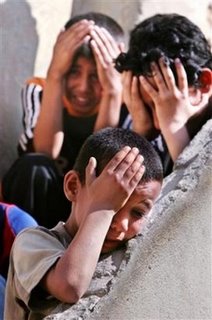By Ali Al-Fadhily and Dahr Jamail / IPS
KHALDIYA, Oct 12 - The bomb went off just outside the school as the IPS correspondent stood speaking to children and teachers within.
The headmaster smiled. "You will hear many of these every day if you stay here another day or two," he said. "The resistance will not stop until the last American leaves."
The children too took no notice of the blast, which shook the doors and windows of the half-destroyed school in this town near Fallujah, 70km west of Baghdad.
The children are growing up in occupied Iraq -- and they are resisting it.
"Americans are bad," said 11-year-old Mustafa. "They killed my family." The family were killed in Operation Phantom Fury of November 2004 as they tried to flee the city, teachers said. That operation killed thousands and destroyed much of Fallujah and towns around it.
"God will send all Americans to hellfire," cried another child in the classroom. Attempts to suggest that not everyone they thought American was bad proved fruitless.
"How can we teach them forgiveness when they see Americans killing their family members every day," the teacher in the classroom who gave her name as Shyamaa told IPS. "Words cannot cover the stream of blood and these signs of destruction, and words cannot hide the daily raids they see."
For the headmaster, the idea of a clash of civilisations is not just an idea.
"The gap between civilisations is widening thanks to the U.S. administration's crimes against humanity all over the world," he said. "They seem determined to tear the world apart, and their footprints cannot be removed for the coming generations."
Outside the school a group of women and some elderly men approached the IPS correspondent. One of the men boasted that his son was a resistance fighter. "I am proud that he is a hero fighting these Americans. And they used to talk to us about our human rights."
Down the street everyone is jumpy. People seemed to be watching out for unusual signs. A driver told IPS that resistance fighters usually give residents some sort of coded warning before they let off a bomb."
As the correspondent stood taking notes on a roadside before leaving Khaldiya, a young man on a bicycle shouted as he passed by: "The one and only solution for the Americans is to leave this province or face death."
The U.S. forces are now leaving some towns. Cities like Dhuluiya, Talafar and Fallujah west of Baghdad have become virtually no-go areas for U.S. forces. Attacks against the U.S.-led Multi-National Forces (MNF) continue to increase.
"They keep asking us to hand over resistance fighters to them," a farmer at a village in the area told IPS. "So that they can torture them in Abu Ghraib, Falcon base, Baghdad airport and other detention centres." But resistance fighters are gaining support, far from being handed over.
Resistance attacks often take the shape of a small car that appears from nowhere. The men inside attack U.S. tanks or trucks carrying soldiers, and disappear fast. Local people never provide U.S. forces with information where the men came from or where they went.
Three to four U.S. soldiers are being killed every day on average in such attacks now. The U.S. Department of Defence says at least 2,754 U.S. soldiers have been killed in Iraq, and more than 44,000 have been wounded or have fallen ill.
U.S. troops are vacating towns, but not the country. Top U.S. military commander Gen. Peter Schoomaker said Wednesday the current level of U.S. troops, about 15 brigades, would be maintained at least through 2010.
"This is not a prediction that things are going poorly or better, it's just that I have to have enough ammo in the magazine that I can continue to shoot as long as they want us to shoot," he said.





